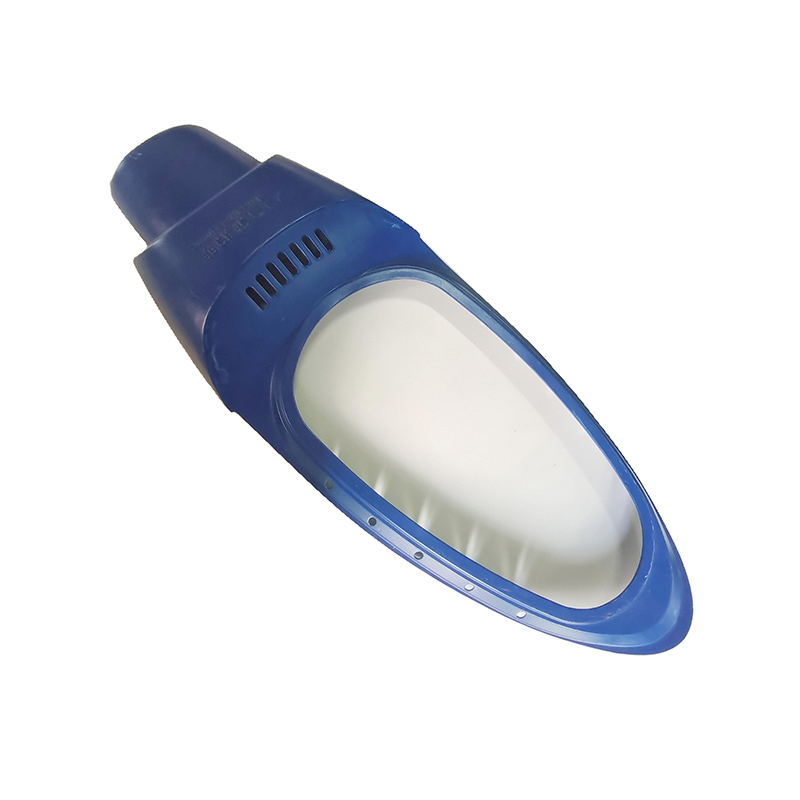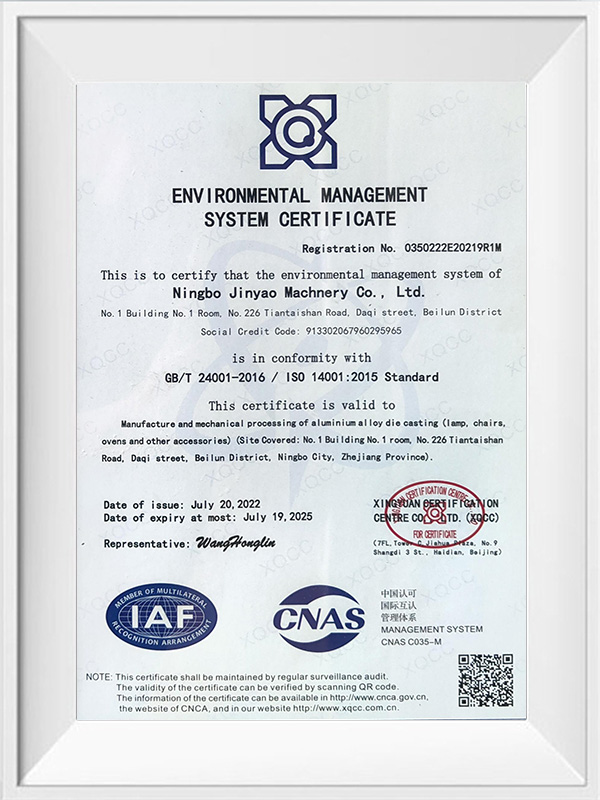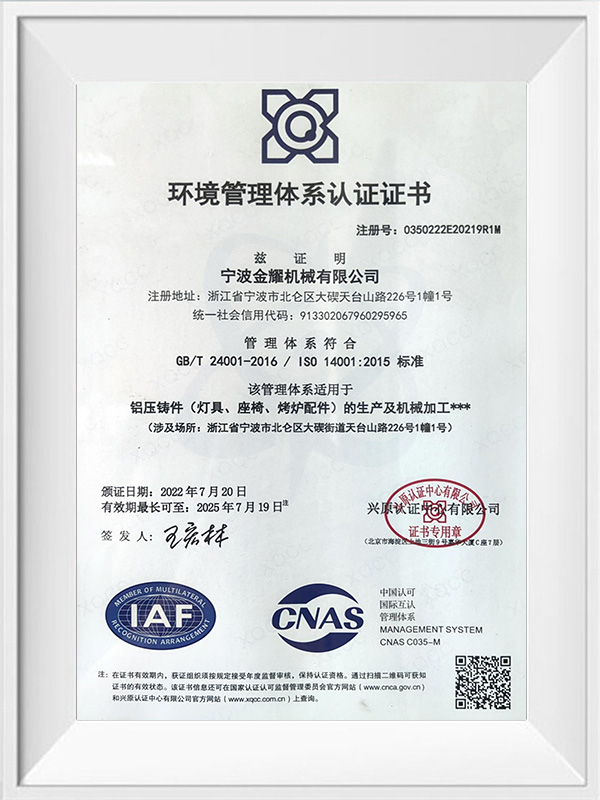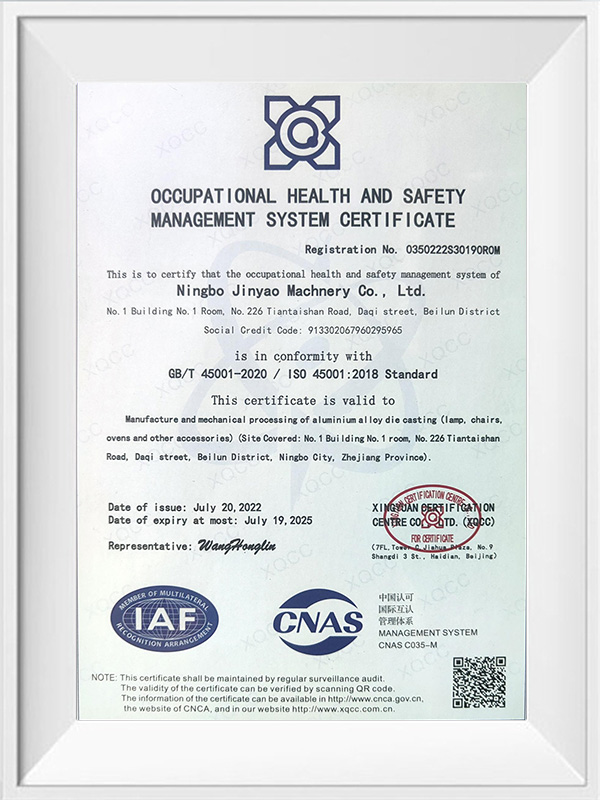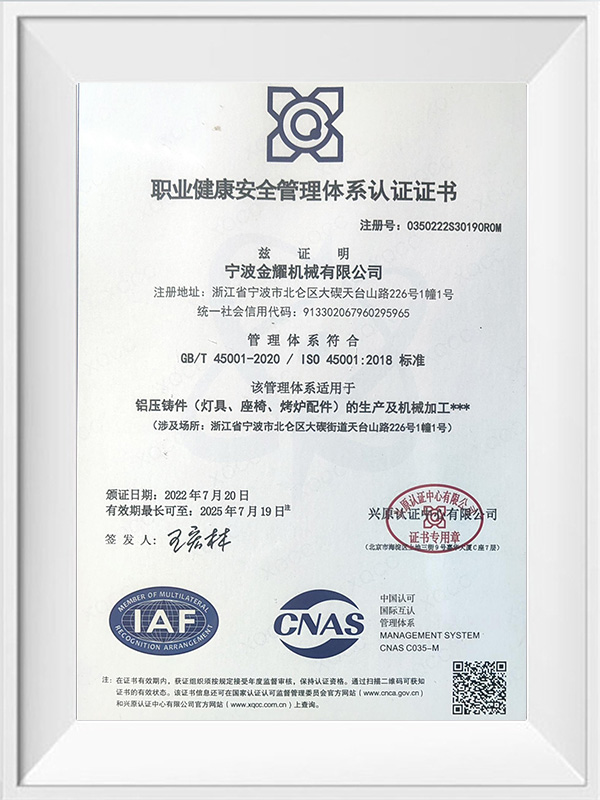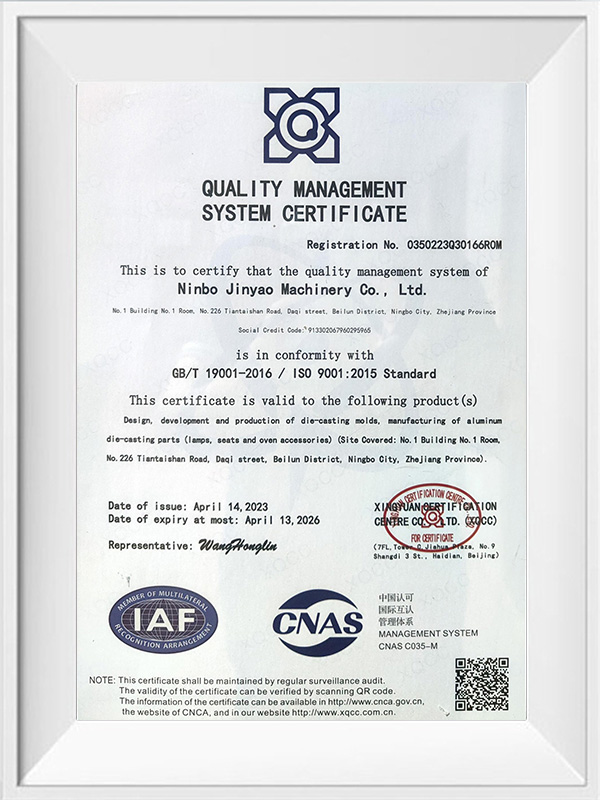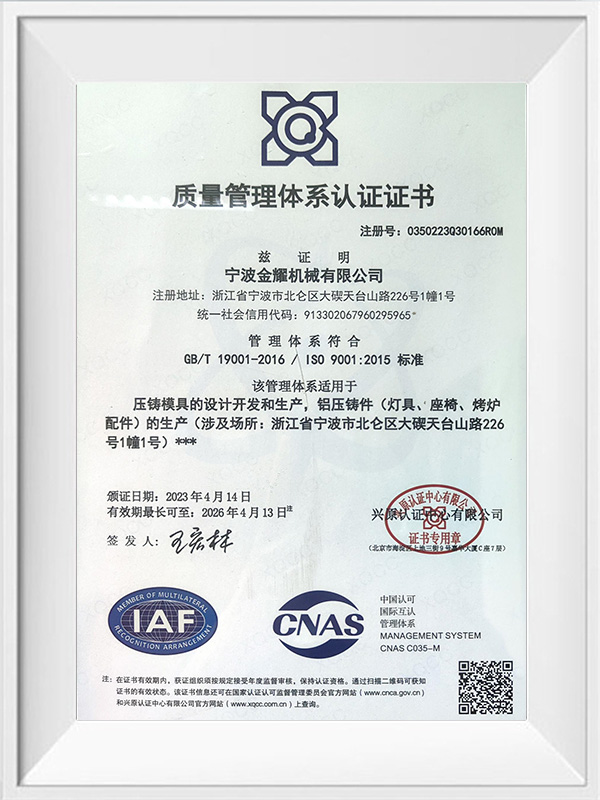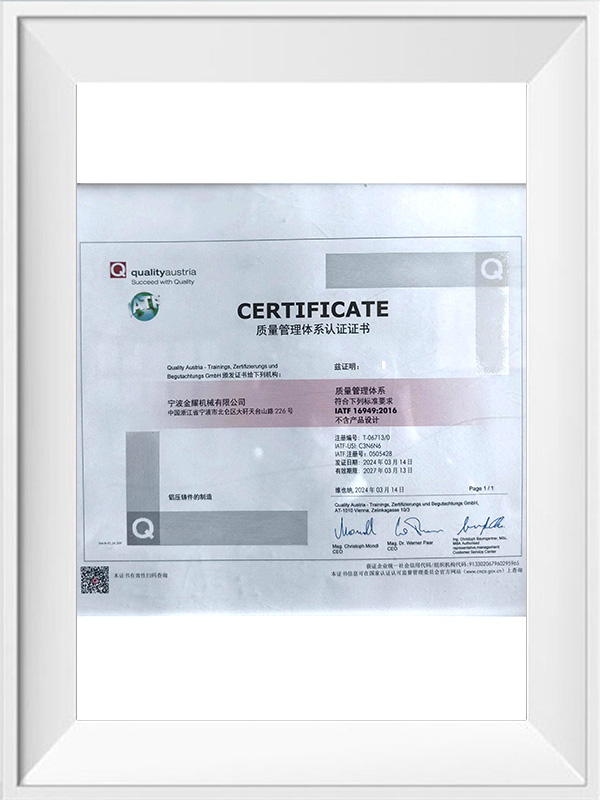Ningbo Jinyao Machinery Co., Ltd. is a China Street lamp housing die castings Suppliers and Street lamp housing die castings Foundry . And is an enterprise integrating industry and trade, dedicated to the production of precision castings of aluminum alloy materials and the design and manufacture of high-pressure die-casting molds. Adopting advanced vacuuming, pin extrusion, and high-pressure spot cooling processes, it is a large-scale professional production base for diversified casting in China. It integrates a precision casting factory and a mechanical processing plant, and can produce precision castings and various types of castings annually. More than 10,000 tons, mainly exported to Japan, Sweden and other countries. Among the customers we cooperate with are many OEM customers of trains, cars, forklifts, outboards, communication equipment, lamps, furniture parts and engineering machinery, including the world's top 500 companies. , has become an important supplier of their precision castings in China.
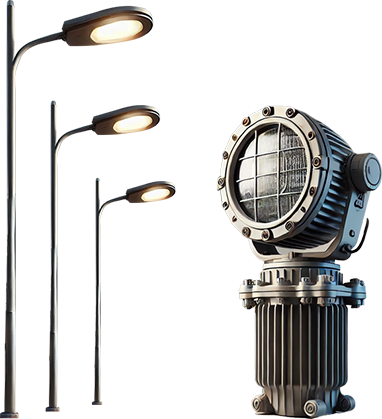
Street lamp housing die castings Suppliers
- Traditional automobile die castings
- New energy automobile die castings
- Communication housing die castings
- Electric scooter die castings
- Bicycle power motor die castings
- Motorcycle accessories die castings
- Motor housing die castings
- Engineering machinery die castings
- Lighting die castings
- Outboard motor die castings
- Furniture accessories die castings
- Grill accessories die casting
- Photovoltaic inverter die castings
Street lamp housing die castings are critical components in outdoor lighting systems, primarily designed to provide robust structural support and heat dissipation for street lamps, ensuring reliable long-term operation under harsh environmental conditions. Typically made from aluminum or zinc alloys, these housings are formed using high-pressure die casting processes, which allow for the efficient production of complex shapes with consistent quality through precision molds. Street lamp housing die castings possess high corrosion resistance, effectively shielding the fixture from external factors like rain and dust, thus extending its lifespan. The thermal conductivity of aluminum alloys enables rapid heat dissipation, preventing the light source from overheating, which enhances both the lamp’s luminous efficiency and energy utilization. Key highlights of street lamp housing die castings also include their favorable strength-to-weight ratio, offering necessary structural integrity while minimizing overall weight, contributing to reduced installation and maintenance costs. With optimized mold design, these die castings achieve a harmonious blend of aesthetics and functionality, meeting the rigorous demands for appearance, durability, and performance in modern street lighting.
-
What Are the Key Technical Challenges in Die Casting Thin-Walled Outboard Motor Housing Components?View More
In the competitive marine propulsion market, the demand for high-performance, lightweight engines has pushed the boundaries of Outboard Motor Die Castings. Specifically, the manufacturing of thin-walled housing components—with wall thicknesses typically below 2.0mm—represents the pinnacle of die-cas...

-
What Quality Standards Should You Look for in a Global Motorcycle Die Casting Supplier for 2026?View More
1. IATF 16949:2016 – The “Entry Ticket” to the Motorcycle Die Casting Industry When evaluating suppliers for Motorcycle Accessories Die Castings, ISO 9001 is merely the baseline; IATF 16949:2016 is the gold standard for international competitiveness. As a quality management system specifically for t...

-
Aluminum vs. Zinc: Which Alloy Is Best for High-Performance Grill Accessories Die Casting?View More
In the competitive market of outdoor cooking appliances, the durability and aesthetic appeal of hardware can make or break a brand’s reputation. When it comes to Grill Accessories Die Casting, manufacturers are primarily faced with a choice between two versatile metals: Aluminum and Zinc. Both alloy...

What are the common materials for die-casting of street lamp housings?
With the acceleration of urbanization, street lamps, as an important part of urban infrastructure, play a role in ensuring nighttime traffic safety, increasing urban beauty and improving environmental comfort. As the core component of street lamps, street lamp housings must not only have excellent strength and durability, but also be able to withstand various harsh environmental conditions. In order to meet these needs, the manufacture of street lamp housings usually adopts die-casting technology, and in the die-casting process, it is crucial to choose the right material.
Common materials
In the street lamp housing die-castings, the commonly used materials are mainly aluminum alloys, zinc alloys and magnesium alloys. Among them, aluminum alloy materials have become the most widely used street lamp shell materials due to their excellent mechanical properties, corrosion resistance and light weight.
1. Aluminum alloy materials
Aluminum alloy materials are widely used in the die-casting production of street lamp housings due to their light weight, high strength and strong corrosion resistance. In the application of street lamp housings, aluminum alloys can not only meet the requirements of strength and durability, but also provide a longer service life. The alloy types commonly used in aluminum alloys include aluminum silicon alloy (A356), aluminum copper alloy (A319), etc. These alloys have good casting properties and mechanical properties and can meet the requirements of high strength and high precision.
The advantage of aluminum alloy is its excellent oxidation resistance, which enables the street lamp housing made of aluminum alloy to effectively resist the erosion of oxidizing substances and ultraviolet rays in the air. In addition, the surface treatment process of aluminum alloy street lamp housing is relatively mature, and its durability and appearance can be further improved by anodizing, spraying, etc.
For example, Ningbo Jinyao Machinery Co., Ltd., as an enterprise focusing on precision die-casting of aluminum alloys, has long been committed to the design and manufacture of high-pressure die-casting molds, and uses advanced vacuum casting, needle extrusion, high-pressure point cooling and other processes to provide customers with high-quality aluminum alloy die-castings. The company's aluminum alloy die-castings not only meet strict domestic and foreign standards, but are also widely used in multiple industries including street lamps, providing global customers with high-quality casting solutions.
2. Zinc alloy material
Zinc alloy is usually used for small street lamp housings or some street lamp housings with high decorative requirements due to its good castability and low melting point. Zinc alloy has high strength and hardness, but its corrosion resistance is relatively poor compared to aluminum alloy, so it is generally suitable for areas with relatively mild environmental conditions.
The advantage of zinc alloy die-casting is that it can obtain very fine surface treatment effects through die-casting, so it is often used in street lamp designs with high appearance requirements. In the zinc alloy die-casting process, the mold has a long service life, and the zinc alloy has good fluidity and can form more complex shapes.
3. Magnesium alloy material
Compared with aluminum alloy and zinc alloy, magnesium alloy has lower density, lighter weight, better shock absorption performance and strong corrosion resistance. Therefore, magnesium alloy has certain advantages in applications that require extremely high lightness and strength. However, magnesium alloy has high technical requirements in the die-casting process, and its processing technology is relatively complex and costly, so its application in street lamp housing is relatively limited.
Factors affecting material selection
When selecting die-casting materials for street lamp housings, multiple factors need to be considered comprehensively, mainly including:
Corrosion resistance: Street lamp housings are usually exposed to the external environment, exposed to the sun for a long time and eroded by wind and rain, so the corrosion resistance of the material is crucial. Aluminum alloy materials have good corrosion resistance because of the natural oxide layer formed on their surface, while zinc alloy and magnesium alloy perform well under certain specific conditions.
Strength and rigidity: The housing of street lamps needs to withstand external impact, wind pressure and other physical stresses. Therefore, aluminum alloy can provide sufficient strength while maintaining good rigidity and seismic resistance, making it an ideal material for street lamp housings.
Appearance design: In addition to functionality, street lamp housings also need to have a certain aesthetics, especially when used in public areas of cities. Surface treatment processes of aluminum alloys, such as anodizing and spraying, can provide rich surface effects to meet the dual needs of beauty and durability.
Production cost: The cost difference of different materials also affects the final product price. Compared with magnesium alloys, aluminum alloys are more moderate in cost, so aluminum alloys have become a common choice in large-scale production.
Ningbo Jinyao Machinery Co., Ltd.'s solution
Ningbo Jinyao Machinery Co., Ltd., as a company specializing in the production of precision aluminum alloy die-castings, combines advanced production technology and strict quality control system to provide high-quality aluminum alloy street lamp housings for global customers. With an annual production capacity of more than 10,000 tons and years of industry experience, the company is able to provide customized die-casting solutions according to customer needs.
By introducing advanced vacuum casting, needle extrusion and high-pressure point cooling technology, Ningbo Jinyao Machinery not only ensures the precision and stability of aluminum alloy street lamp housings, but also improves the strength, corrosion resistance and UV resistance of products, enabling its products to maintain long-term stability in extreme environments. In addition, the company has established long-term cooperative relations with many Fortune 500 companies, and its products are widely exported to Japan, Sweden and other countries, with wide international market recognition.
How to effectively control the fluidity of aluminum liquid in the die-casting process of street lamp housings
Aluminum alloy die-casting is widely used in various industrial and civilian products, and street lamp housings are a typical representative. Aluminum alloy materials dominate the manufacture of street lamp housings with their excellent mechanical properties, corrosion resistance and light weight. However, to ensure the precision and quality of aluminum alloy castings, it is crucial to control the fluidity of aluminum liquid. In the die-casting process of street lamp housing, the control of aluminum liquid fluidity not only affects the surface quality of the casting, but also determines the casting accuracy, strength and subsequent processing efficiency.
Key factors of aluminum liquid fluidity
Aluminum liquid fluidity refers to the flow ability of aluminum alloy melt in the die-casting mold. This characteristic directly affects the molding quality of aluminum alloy die-casting parts. There are many factors that affect the fluidity of aluminum liquid, mainly including the following aspects:
Aluminum liquid temperature
The temperature of aluminum liquid is crucial to its fluidity. Too low temperature will cause the aluminum liquid to be viscous and have poor fluidity, making it difficult to fill the mold, and easily cause defects such as pores and cracks; too high temperature may cause aluminum liquid oxidation, affecting the strength and quality of aluminum alloy. Therefore, it is very important to accurately control the temperature of aluminum liquid.
Injection speed and pressure
Injection speed and pressure are another important factor in controlling the fluidity of aluminum liquid. High-speed and high-pressure injection can quickly fill the mold, reduce the residence time of aluminum liquid in the mold, and avoid excessive oxidation reaction of aluminum liquid during the flow process. However, too fast injection speed may also cause bubbles, splashing and uneven distribution of aluminum liquid, so it is necessary to adjust the injection speed and pressure according to the fluidity of aluminum liquid and the complexity of the mold.
Mold design
The design of the mold directly affects the flow path of the aluminum liquid and the filling effect of the casting. Reasonable mold design can make the aluminum liquid flow evenly, reduce the formation of dead zones and stagnation zones, and thus avoid defects such as pores and cold shuts.
Composition and casting temperature of aluminum alloys
The composition of aluminum alloys and their casting temperature have a great influence on fluidity. For example, aluminum silicon alloys have good fluidity and are suitable for castings with complex shapes, while aluminum copper alloys have higher strength but poor fluidity and are suitable for simpler castings.
Technology for effectively controlling the fluidity of aluminum liquid
During the production process of street lamp housing die casting, Ningbo Jinyao Machinery Co., Ltd. successfully controlled the fluidity of aluminum liquid by adopting a series of advanced technologies, thereby ensuring the quality and precision of aluminum alloy die castings. The following are several key technologies:
1. Vacuum casting technology
Vacuum casting technology plays a vital role in the die casting process, which can effectively control the fluidity of aluminum liquid and reduce the oxidation reaction of aluminum liquid. Ningbo Jinyao Machinery Co., Ltd. uses advanced vacuum casting technology to improve the fluidity and filling effect of aluminum liquid by eliminating air and impurities and reducing the generation of bubbles during the casting process. In this way, the aluminum liquid can flow quickly and evenly in the mold, ensuring the surface quality of the street lamp housing and avoiding defects such as pores and cold shuts.
2. High-pressure point cooling technology
High-pressure point cooling technology is an effective temperature control method that can control the solidification rate of aluminum liquid through local cooling during the flow of aluminum liquid, thereby adjusting its fluidity. This technology can optimize the flow process of aluminum liquid by accurately controlling the cooling rate of the mold surface and avoid the shrinkage problem of aluminum alloy caused by too fast cooling. In the die casting of the street lamp housing, Ningbo Jinyao Machinery Co., Ltd. uses this technology to effectively avoid the uneven flow of aluminum liquid in the mold and ensure the precision and strength of aluminum alloy castings.
3. Needle extrusion technology
Needle extrusion technology improves the fluidity of aluminum liquid and enhances the filling ability of aluminum liquid in the mold. This technology guides the aluminum liquid to various parts of the mold during the die-casting process, effectively avoiding the formation of dead zones and retention zones in the mold, reducing the waste of aluminum alloy, and improving the molding accuracy of the casting. Through this technology, Ningbo Jinyao Machinery Co., Ltd. is able to improve the surface quality and structural density of the street lamp housing die castings, ensuring the stable quality of each aluminum alloy casting.
4. Reasonable mold design and optimization
Mold design is one of the important factors affecting the fluidity of aluminum liquid. Ningbo Jinyao Machinery Co., Ltd. adopted precise flow channel and gating system design when designing the mold to ensure the uniform flow of aluminum liquid in the mold. Especially in complex castings such as street lamp housings, the optimization of mold design can effectively reduce the flow resistance of aluminum liquid, ensure that aluminum liquid can quickly fill every corner of the mold, and avoid incomplete filling or casting defects.
5. Liquid aluminum fluidity detection and real-time monitoring
In the aluminum alloy die-casting process, it is very important to monitor the fluidity of aluminum liquid in real time. Ningbo Jinyao Machinery Co., Ltd. uses advanced fluidity detection technology to monitor the flow state of aluminum liquid in real time through high-precision sensors and control systems. This technology can timely adjust the temperature, pressure and injection speed during the production process, thereby optimizing the fluidity of aluminum liquid and ensuring the casting quality of street lamp housings.

 English
English Español
Español Deutsch
Deutsch русский
русский Traditional automobile die castings
Traditional automobile die castings New energy automobile die castings
New energy automobile die castings Communication housing die castings
Communication housing die castings Electric scooter die castings
Electric scooter die castings Bicycle power motor die castings
Bicycle power motor die castings Motorcycle accessories die castings
Motorcycle accessories die castings Motor housing die castings
Motor housing die castings Engineering machinery die castings
Engineering machinery die castings Lighting die castings
Lighting die castings Outboard motor die castings
Outboard motor die castings Furniture accessories die castings
Furniture accessories die castings Grill accessories die casting
Grill accessories die casting Photovoltaic inverter die castings
Photovoltaic inverter die castings